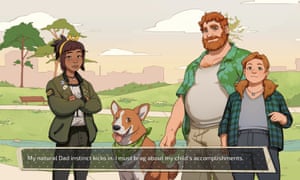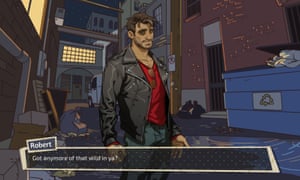Dream Daddy: how the gay dad dating sim became a hit game of the summer | Technology
Robert is a bad boy who enjoys whisky, leather jackets and skulking in alleyways. Brian is a large, jolly chap who looks a tiny bit like the Ghost of Christmas Present from The Muppets Christmas Carol. Damien is a cape-wearing goth who loves blood, hates garlic, and wonders why Hot Topic would describe a ruffled blouse as “Victorian†when it’s so clearly Edwardian. Ugh, the savages.
All of these seemingly disparate men have one thing in common: they’re dads looking to date other dads in a new game called Dream Daddy: A Dad Dating Simulator. Launched earlier in July, it’s currently holding the top spot on Steam, the dominant online PC games store better known for sci-fi shooters and serious fantasy role-playing adventures. Excitement round the title was so high, that when the release was delayed by a few hours, co-developers Vernon Shaw and Leighton Gray had to post an apology to wildly expectant fans on Twitter. It received over 17,000 likes.

If your idea of “dad†is, well, your dad, the stereotypical papa with that telltale horseshoe of hair and an interest in old cars, new golf clubs and calling you up to ask if you’ve done your taxes yet, then think again â€" these are dads for our modern age. These are dads that wear loud, cat-print shirts, that have pierced eyebrows and purple hair, dads that listen to cool bands because they want to and not because they’re trying to impress younger co-workers.
In Dream Daddy, you are also one of those dads, and they want to date you.
The game works like most other dating simulations, a genre that’s been around for over 30 years, but doesn’t often get mainstream coverage â€" usually, you follow a story, meet potential partners, chat to them, date them and see if you can end up with the nicest. In Dream Daddy, your character (who you get to intricately customise) moves into a new town with your 18-year-old daughter in tow, after recently being widowed. You’re ready to move on and meet a bunch of eligible men within your first hour or two of arriving. They’re all looking for love, and love just happens to look like whatever you’ve designed your character to look like. Through conversation, dialogue choices and mini-games, you will try to impress those dads until they like you enough to take it to the next level (although there is nothing more explicit than the implication of sex and the occasional glimpse of boxer briefs).
So how did a game about dads dating each other - a relatively niche subgenre of an already niche kind of game - become number one on Steam, a PC store with over 125m users?
Well, Dream Daddy’s success is indicative of a confluence of multiple themes becoming popular right now. First, there’s the “daddy†trend in current pop culture, where “daddy†means an older man who is sexually interested in younger men or women. The term has been around for a while, and has started to filter into video game design in recent years. An exact definition is harder to pin down; it is usually refers to a character, who is larger and typically older than the average player, someone serious but with a sense of humour â€" someone you look up to even when you’re playing the game as them. Think Geralt, the gruff-voiced monster slayer from from The Witcher, or Mitsurugi, the elder statesman from the Soul Caliber series of fighting games. Some modern characters are more overtly paternal, such as Joel from post-apocalyptic adventure The Last of Us, Booker DeWitt from Bioshock Infinite and Nathan Drake’s surrogate father figure Sully in Uncharted. These are dadd ies that you can’t help but want to please â€" and they have become a key element of mainstream games design.
Secondly, there is a growing demand for queer games in an industry where mainstream hits tend to represent the white, hetero male-gaze, leaving straight women, people of colour and a huge proportion of LGBT people out in the cold. For years they have had to make do with independently made visual novels, dating games imported from Japan or the “everyone is bisexual†approach of Bioware’s Dragon Age and Mass Effect games. It’s not that games by and for this diverse market don’t exist but they often don’t receive the publicity they need to get them into the hands of as many people who want them. Dream Daddy, however, has enjoyed the push of its publisher, Game Grumps â€" a hugely influential YouTube channel with nearly 4 million subscribers. Given this boost, Dream Daddy proves there’s a largely untapped audience queer-themed games.

There is also a growing interest in games that think about and explore relationships, rather than just using humans as action ciphers. A broadening, diversifying audience and a growing community of creators who see games as a mode of self-expression means that we’re seeing more titles that revolve around personal interactions, character customisation, romance and choice. The Sims has always been the obvious standard bearer here, but recent critical hits such as Gone Home, Life is Strange and the experimental titles of Nina Freeman, Christine Love and Robert Yang are pushing in games toward human complexity.
It’s genuinely funny, it’s sincere, it doesn’t poke fun at its players or its characters, it never punches down and it features positive depictions of gay and trans characters that don’t feel shoehorned in or spotlighted in uncomfortable ways. The interactions between dads and other dads and between the dads and their kids are all depicted as important and meaningful. Dream Daddy promotes healthy attitudes towards fatherhood, dating and sex. In these uncertain, troubling times, it could be exactly what people need.

0 Response to "Dream Daddy: how the gay dad dating sim became a hit game of the summer | Technology"
Posting Komentar